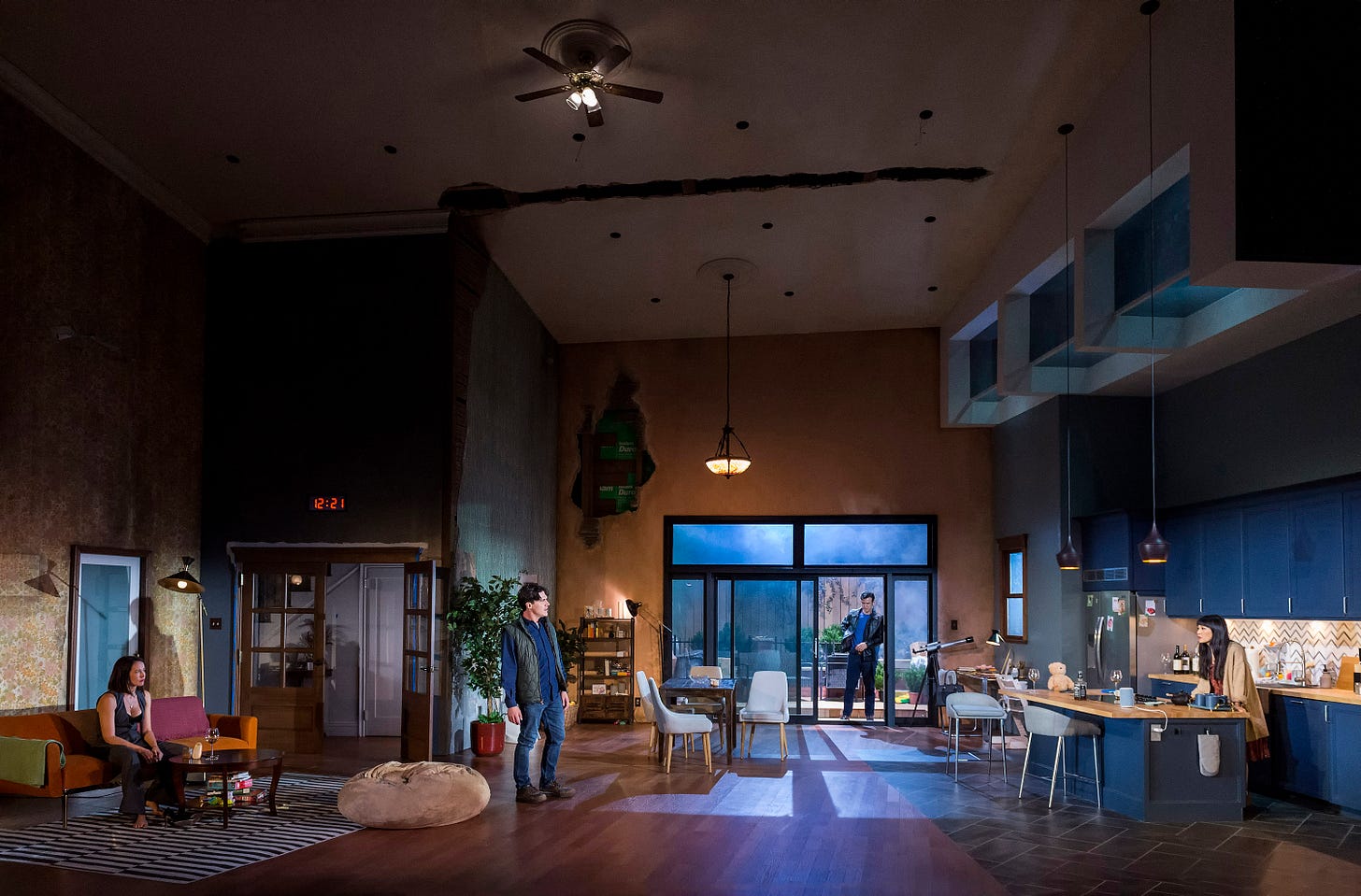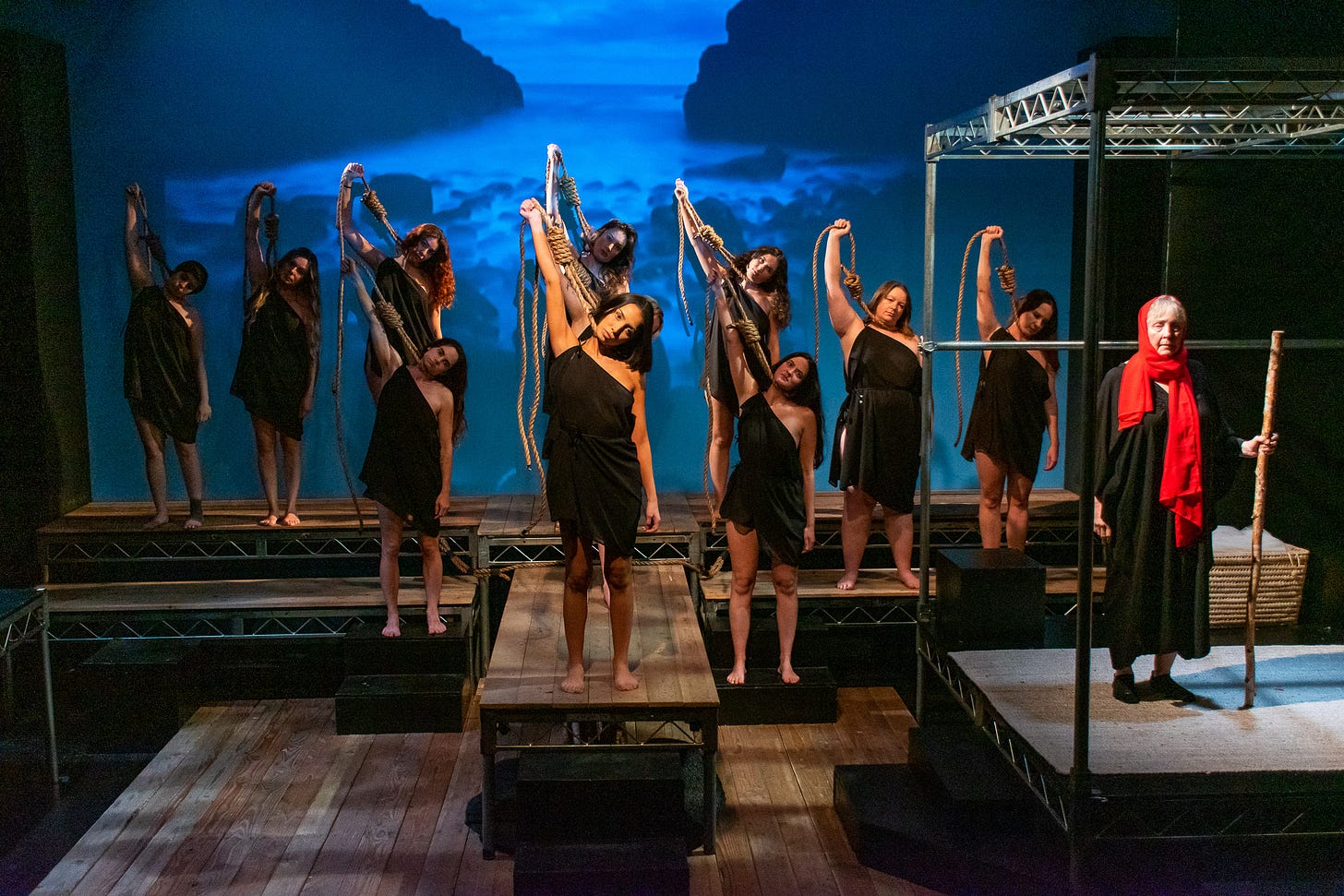Confrontations with classics: 'The Inheritance' and 'Penelopiad'
Also: '2:22,' 'To Kill a Mockingbird,' 'Rent,' 'Eisenhower'
When a narrative work of art attains “classic” stature, it often settles comfortably into collegiate required-reading lists — but loses its share of the current limelight.
So if E.M. Forster or Homer were alive today and sampling theater on the west side of Los Angeles County, would they be delighted that their creations are again being mentioned outside the classroom?
Or would they be disturbed that their works are reference materials for playwrights with distinctively 21st-century perspectives — and that these writers are adapting the originals to reflect previously unrepresented points of view?
I’m talking about the West Coast premiere of Matthew López’s “The Inheritance” at Geffen Playhouse in Westwood and the professional LA premiere of Margaret Atwood’s “The Penelopiad” at City Garage in Santa Monica.
The former is modeled on Forster’s 1910 novel “Howards End” but set in the 2010s and focused on gay men. The latter is a fresh examination of one of the oldest classics in the canon, Homer’s “The Odyssey,” highlighting the women who stayed in Ithaca.

“The Inheritance” is massive, divided into two parts (often seen on different days), with a total running time of more than six hours. Staged here by Mike Donahue, almost all of it is thoroughly engrossing.
The title refers not only to specific items that are inherited during the narrative, but more broadly to the contributions of previous generations of gay men during the mostly closeted past, especially during the AIDS crisis before treatments were developed.
The play’s references to “Howards End” and also to Forster’s explicitly gay novel “Maurice” — which wasn’t published until after the author died in 1970 — are central in López’s play. Forster himself (Bill Brochtrup) appears as an important guide, even as a moderator, in “The Inheritance.”
But it’s hard to avoid the feeling that “The Inheritance” is also an update on Tony Kushner’s AIDS-period “Angels in America” — with a matching two-part structure and length. And don’t forget “Love! Valour! Compassion!,” which is set among gay men in Dutchess County, two hours north of New York.
Terrence McNally, who wrote “Love!…”, died in 2020 in the first wave of COVID, but he was a mentor of López and had already seen “The Inheritance,” which was initially produced in London in 2018 and then on Broadway in November 2019.
Broadway’s “The Inheritance” wasn’t a hit, even before COVID arrived, and closed immediately in the wake of the virus. So yes, Angelenos are among the first to see “The Inheritance” since the arrival of COVID — with its partial parallels to AIDS.
There are six main contemporaneous characters. Eric (Adam Cantor) and Toby (Juan Castano) begin the play as a couple in their 30s who live in an enviable rent-controlled Manhattan apartment. Wealthy, Republican Henry Wilcox (Tuc Watkins), a character whose name is drawn directly from “Howards End,” and Walter Poole (Brochtrup, again) are a somewhat older couple. Bradley James Tejeda plays promising young upper-class stage actor Adam — as well as his lookalike Leo, a desperate prostitute.
Apart from Walter, all of these men become more or less entangled with each other — in many ways, including sexual trysts. But when the focus turns to sex, the spoken words are more graphic than the onstage action.
Eight other men play smaller roles and serve as an onstage Greek chorus, chronicling and commenting on the action along with Forster himself. This use of narration allows the novelistic plot to move forward without any realistic sets — the men stride over or hover near the edges of a large raised platform.
The length of the script is a problem only near the end of part two, when suddenly a brand-new character appears. She is the only female character — perhaps a token woman? The brevity of her appearance encourages that conclusion, and her contributions to the narrative don’t seem vital.
Eric has a line in “The Inheritance” that inadvertently underlines the lack of women in the “oral histories” on display in the play: “Think about the ancient epics: ‘The Odyssey,’ ‘The Mahabharata,’ oral histories that allowed cultures to understand themselves. In order to become an honorable Greek, one had to understand the actions of Odysseus.”
But what about Odysseus’ wife Penelope?
Margaret Atwood, author of “The Handmaid’s Tale,” provided an answer to that question in “The Penelopiad,” a 2005 novella that she turned into a stage play two years later. It’s currently receiving its LA County professional debut at City Garage, staged by Frederique Michel.
Atwood noticed that in “The Odyssey,” after Odysseus returned to Ithaca and killed the suitors who had been pestering Penelope, he also hanged a dozen, well, handmaids — apparently because they were said to have joined some of the suitors in bed.
In Atwood’s tale, these young women had been undercover agents in Penelope’s campaign to discourage the suitors. But they also were slaves — who were raped, then had to clean up the remains of the dead rapists, and then were executed. This wasn’t discussed in my required reading of Homer’s tale. But it’s recalled by the now-dead Penelope (Peggy Flood) who is speaking from Hades.
Grim? Yes, but “Penelopiad” is surprisingly sprightly in its earlier scenes, with flashes of wit and lively musical interludes. Besides Flood, the completely female cast consists of a dozen women who play not only the maids but also other characters —such men as Odysseus, Penelope’s son Telemachus and the kings of Sparta and Ithaca, plus other women such as Helen of Troy, the household staff doyenne Eurycleia, Penelope’s naiad mother and the young Penelope.
In case you’re thinking this large cast of characters might make this re-interpreted epic as long as, well, “The Inheritance,” think again. The performance lasts only a couple of hours. For those who have never been to City Garage, perhaps I should also note that nudity is abundant.
By the way, “Penelopiad” is not to be confused with “Penelope,” a 2010 play by Enda Walsh. In Walsh’s play, the updated “suitors” literally speak all of the lines, while Penelope remains silent. LA’s Rogue Machine produced it in 2014.
I’d like to see A Noise Within, LA’s primary classics company, tackle “Penelopiad” one of these years. August Wilson’s “Radio Golf,” which is often considered the weakest of his monumental 10-play cycle, recently closed at A Noise Within.
And elsewhere in LA:

“2:22,” at Center Theatre Group’s Ahmanson Theatre, is subtitled “a ghost story” — in the sense of “Boo, are you scared now?”, not in the sense of the dead victims of AIDS who inhabit parts of “The Inheritance.” However, like “The Inheritance,” it opened first in London and apparently became quite a hit there. Go figure.
The frights feel faux in Matthew Dunster’s staging of Danny Robins’ script. It might be slightly scarier in the closer quarters of a smaller theater, but I’m not eager to see it again. By the way, it officially opened on November 4 — four days after the one day when the culture celebrates that “Boo, are you scared now?” feeling. But at least the previews started on October 29, so who’s counting?
Harper Lee’s “To Kill a Mockingbird” is currently at the Pantages in its recent Broadway version, as adapted by Aaron Sorkin. Richard Thomas plays Atticus Finch in this tour, which also will play in Costa Mesa at Segerstrom Center Dec. 27-Jan. 8. Sorkin apparently added a little more emphasis on the objections of the housekeeper Calpurnia to Atticus’ ‘30s-white-liberal optimism. But this “Mockingbird” didn’t sing for me — again, as in “2:22,” the space isn’t intimate enough for this rather tired retread.
Other than “Penelopiad,” I haven’t seen anything recently in the smaller theaters that approaches the “hallelujah” level. But I will note that Reena Dutt’s revival of Jonathan Larson’s “Rent,” for a Coeurage Ensemble production at the Shakespeare Center — just west of downtown LA — has a distinctive staging. The audience sits and swivels on revolving office chairs in the center of the space, surrounded on nearly all sides by different sets, with the actors moving frequently around the circle of spectators.
Unfortunately, I regret sitting too close to the three-piece band — the lyrics were often overpowered by the music. And there were some sightline problems as well, when the action was exactly on the opposite side of the circle from where I was. I stood up several times for a better view, which was permissible because no other spectators were behind me. Still, the innovative configuration provided that little jolt of excitement for a revival of a familiar show that was missing from the revival of “To Kill a Mockingbird.”
Finally, I had a personal reason to see the premiere of “Eisenhower: This Piece of Ground,” a solo at Theatre West, in association with director Peter Ellenstein’s New LA Repertory Company, starring the estimable John Rubinstein.
When I first became aware that there was a president, Eisenhower was in the Oval
Office. My brother and I played with a plastic-toy White House which came with three-inch statuettes of all the presidents — but only one First Lady, the then-current holder of that title, Mamie Eisenhower.
Back then, I assumed that Eisenhower was a great man because he was, well, the president. I long ago cast away such assumptions. However, as Richard Hellesen’s play points out, historians today rate Eisenhower much higher than they did in most of the years between his presidency and now. In fact, in this survey, he’s ranked fifth among all of our chief executives — a higher place than any other president since he served.
Rubinstein looks more like Ike than I would have imagined, but the play is stuck in the great-man-talking-into-a-tape-recorder format. The addition of even one more character might have created at least a modicum of drama.
Still, remembering Ike is a mild tonic for anyone who’s beholding the chaos that is currently dominating his party.

